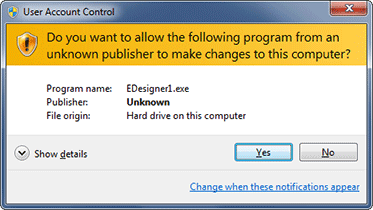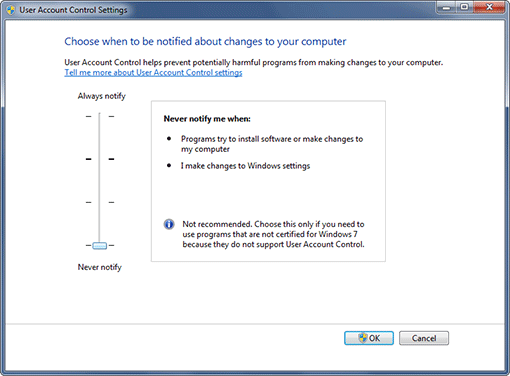
Technical Note 22
Overcoming Problems Under Windows 8/7/Vista
This topic was originally written for Windows 7 and Vista but it also applies to Windows 8.x. Plus, some of the suggestions in it also apply to Windows XP and earlier versions of Windows (such as the sections dealing with "Best Installation Practices" and "Over Protective Security Software").
Eminence Designer has been tested under both 32-bit and 64-bit versions of Windows 8, 7 and Vista using U.S. English editions of these operating systems and no installation or operational problems have been observed at our facility. Yet, from time to time we receive reports of problems in the field. If you have trouble installing or running Eminence Designer, the following suggestions and procedures may help:
Solutions
Best Installation Practices
Over-Protective Security Software
Compatibility Mode and Privilege Level
Best Installation Practices
Windows 8, 7 and Vista have a more stringent security system than previous versions of Windows and this reduces the number of installation options. The following suggestions should help you avoid unnecessary problems:
- If it has been a while since you last started Windows, restart your computer so you are using a fresh instance of Windows.
- Use a Windows user account with administrator privileges to install Eminence Designer. Use the same user account to run Eminence Designer after it is installed.
- Exit all unnecessary programs before beginning the installation. Ideally, the only program that is running when you start the setup program is Windows, itself.
- Use the default settings for the installation, including the default path for the program.
- If you need to re-install Eminence Designer, first remove any previous installation of the program (see the "Over-Protective Security Software" section below for instructions on how to remove Eminence Designer).
Over-Protective Security Software
Security software is important and we recommend that all computer users take adequate steps to protect their computers with up-to-date security software like antivirus, antispyware, anti-malware and firewall programs. Unfortunately, security software is sometimes too aggressive and interferes with the legitimate operation of setup programs when software is installed or updated. We've never had a problem with the Norton/Symantec security software but some users have reported problems with security software from other vendors.
The symptoms can vary: The Eminence Designer setup program may appear to start okay but then hangs. Or the setup program may appear to run and finish properly yet Eminence Designer won't start. The solution is to temporarily turn off the security software during the installation of Eminence Designer. However, you should first remove any previous copies of Eminence Designer that may have been partially installed on your computer. The following steps may help:
- If this is not the first time that you've attempted to install Eminence Designer on this computer, then any existing full or partial installations of Eminence Designer should be removed as follows:
How to Remove Eminence Designer 1
Launch the Windows Control Panel from the Windows Start menu and click on "Uninstall a program" as shown below:
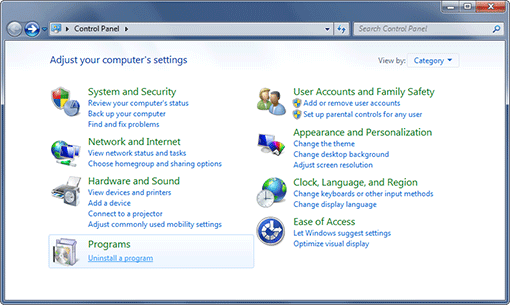
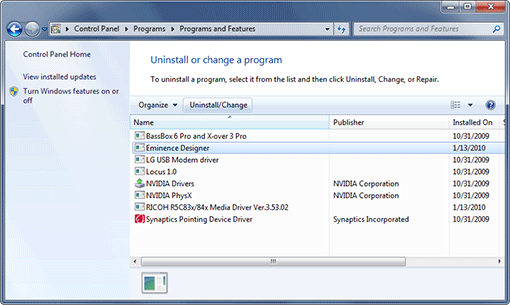
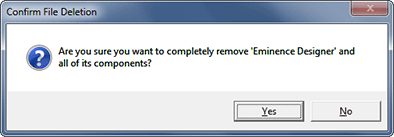
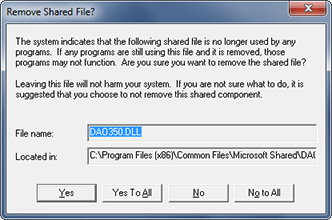
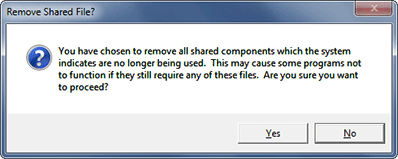
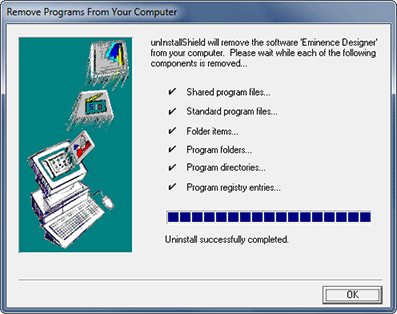
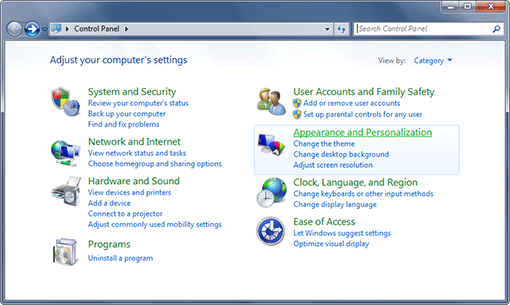
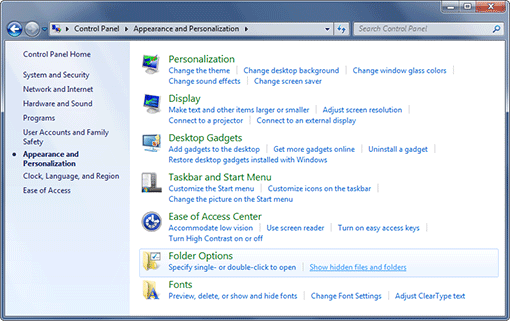
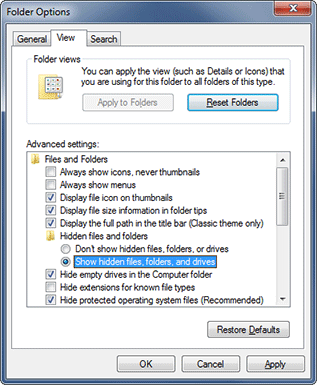
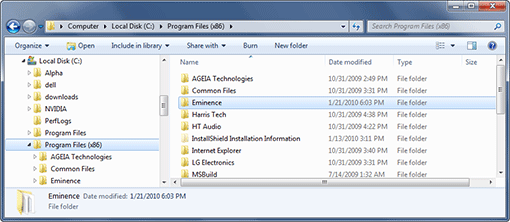
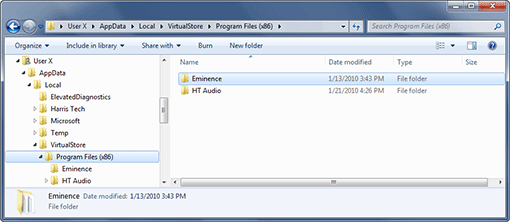
- Restart your computer. One way to do this is to select "Shut down > Restart" from the Windows Start menu (shown below).

- Disconnect your computer from all networks including the internet.
- Turn off or disable all antivirus, antispyware, anti-malware and firewall programs. Ideally, just Windows should be running.
- Install Eminence Designer. See Technical Note 20 for detailed step-by-step instructions.
- Turn back on or enable the antivirus, antispyware, anti-malware and firewall programs before reconnecting to a network including the internet.
- If desired, restore the Folder Options back to their orignal settings with the Windows Control Panel.
Compatibility Mode and Privilege Level
This section addresses the unrelated subjects of compatibility and privilege because they are managed in the same place in Windows and because problems involving them can manifest similar symptoms.
Regarding compatibility, some older programs cannot run as native applications under Windows 8, 7 and Vista. If they run at all, they require you to configure Windows to emulate an older version of Windows while the application is running.
Regarding privilege, one of the purposes of the security system in Windows 8, 7 and Vista is to prevent unauthorized changes to the operating system and programs on your computer so it restricts the privileges of applications. Unfortunately, it sometimes appears that this system is over-protective and will prevent legitimate operations which you did authorize like the running of the Eminence Designer 1 installer or the running of Eminence Designer 1, itself.
As we wrote at the top of this page, we have not been able to get Windows 8, 7 or Vista to exhibit problems with either compatibility or privilege in our lab and, even though it is rarely reported by our users, enough reports have surfaced to prompt this section. In most cases (but not all) the computers involved where not in the U.S. and were running international versions of Windows 8, 7 or Vista. The symptoms vary and include:
- The setup program fails to start even when you double-click directly on it.
- The setup program hangs even though you have turned off or disabled all antivirus, antispyware, anti-malware and firewall software.
- Eminence Designer 1, itself, fails to start or it hangs after you start it.
- Every time that Eminence Designer 1 is launched, its Welcome/configuration system starts. This should only happen the first time that you run the program. After you've completed the initial configuration process and clicked on its "Finish" button, you should not see it again. If you do, then the link between Eminence Designer and its "VirtualStore" folder in Windows has not been established.
- Changes made to the Preferences of Eminence Designer 1 are not remembered after you close and restart the program.
- Every time you save a speaker design, it disappears and cannot be opened again.
The following steps begin with the Eminence Designer 1 setup program on the installation CD-R and describe how to control its compatibility and permission settings of Windows 7 and Vista to help you circumvent these kinds of problems. Similar principles apply to Windows 8.x and to the Eminence Designer program, itself, and the maintenance updates available from our website.
- If this is not the first time that you've attempted to install Eminence Designer 1 on this computer and the installer appeared to start earlier, then you should remove any partial installations before proceeding. See the previous Over-Protective Security Software section for removal instructions.
- With the installation CD-R disc in the computer, run the Windows Explorer (Windows key+E) and navigate to the "setup-d" folder on the CD-R (E-Designer). Right-click on the "setup.exe" file and select "Properties" from the popup menu as shown below:
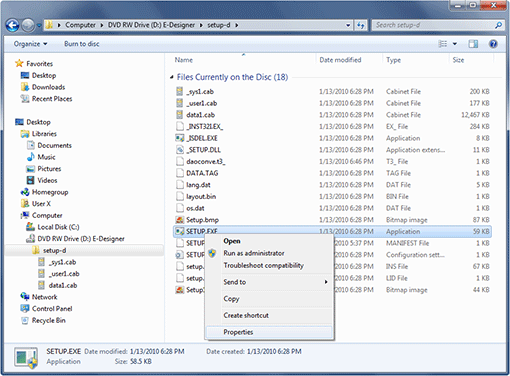
- The Setup.exe Properties dialog will open. Select the "Compatibility" tab as shown below:
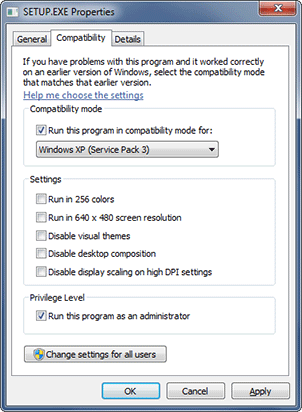
- Check "Run this program in compatibility mode for:" at the top and choose "Windows XP (Service Pack 3)" for the mode.
- Check "Run this program as an administrator" in the Privilege Level section at the bottom.
- Click the "OK" button to accept these settings and close the dialog.
- Now you are ready to attempt to install Eminence Designer 1 again. Return to the Windows Explorer and double-click on the setup.exe program to launch it and begin the installation. If desired, see Technical Note 20 for detailed step-by-step instructions.
- Right-click on Eminence Designer and select the "Properties" command from the popup menu. There are three places where you can do this and you only need to do it at one of them. If you see a large Eminence Designer icon in the Windows Start menu (shown below), you can right-click on it there.
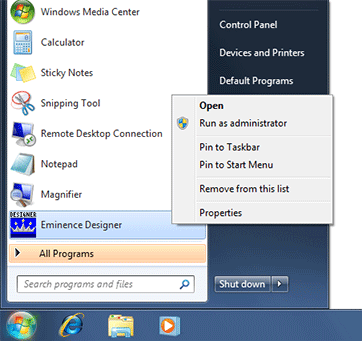
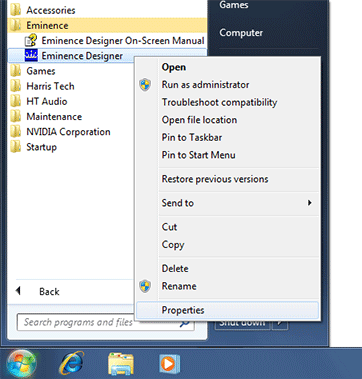
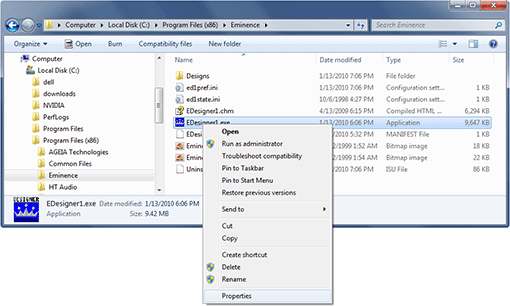
- Once you've selected the "Properties" command in the popup menu, the Eminence Designer 1 or EDesigner1.exe Properties dialog will open. The number of tabs it contains will vary depending on which of the three locations described above that you chose, but they will all have the "Compatibility" tab as shown in the examples below. Select it.
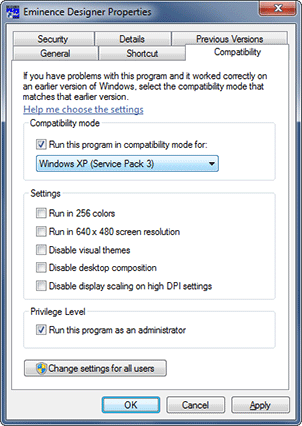
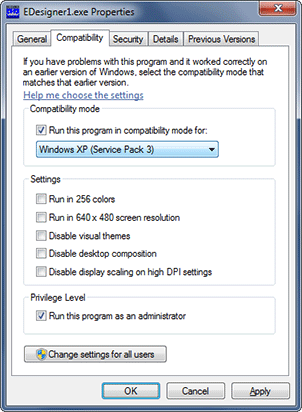
- Check "Run this program in compatibility mode for:" at the top of the dialog and choose "Windows XP (Service Pack 3)" for the mode.
- Check "Run this program as an administrator" in the Privilege Level section at the bottom.
- Click the "OK" button to accept these settings and close the dialog.
